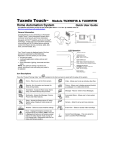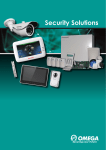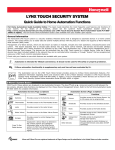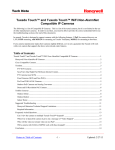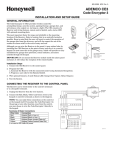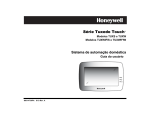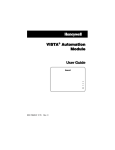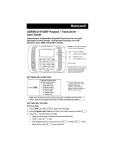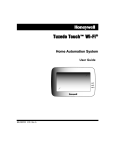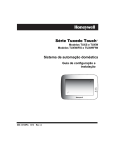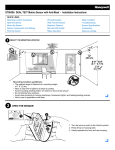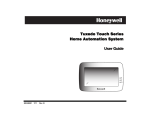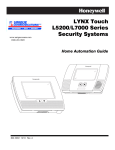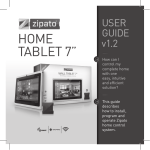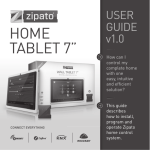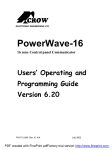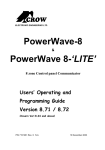Download TuxWifi Home Automation System Quick User
Transcript
Tuxedo Touch TM Models TUXWIFIS & TUXWIFIW Home Automation System Quick User Guide General Information Congratulations on your ownership of a Honeywell Tuxedo Touch™ Home Automation System which combines Security and Automation for your home. Equipped with Wi-Fi® capability and built-in ZWave® technology, Tuxedo uses your home Wi-Fi network to communicate with Wi-Fi enabled devices allowing control of Z-Wave® devices, (cameras, lights, door locks, garage door controllers, water valve controllers and thermostats, etc.) For detailed setup instructions see the full User Guide [800-16573V2 8/15 Rev. A] available online at: https://mywebtech.honeywell.com/. LED Operation Your "Home" screen is displayed most of the time and can be customized via the Multimedia Application. From this screen you can control: • the security system • multimedia applications (video, pictures and cameras) • home automation (lighting, thermostat and door locks, garage door controllers and water valves). NOTE: For optimum viewing of screens and menus, the device’s font size setting may need to be adjusted. Icon Descriptions Press Product/Training Video (located on the Home screen) to assist with the setup of the system. Home - Returns you to the Home screen. Video - Allows user to set up and play video files. Security- Arm the system and access the three arming modes. Picture - Allows user to display personal photo(s) as wallpaper or in a slide show format. Automation - Access Z-Wave setup, Scene setup, and Room/Group setup screens. Message - Record / retrieve Voice Messages. Multimedia - Access the Message, Camera, Picture and Video features. Annunciate Status - Allows user to hear system status. Setup - Access the Setup menus; IP setup, System setup, Display & Audio setup and Account. Camera – Quick access to the video option Weather - Press to access weather settings. Event View – Press to access video recordings. Panic – Displays Emergency functions (as programmed by the installer). Note: This icon is displayed and active on all screens except while in the Clean Screen mode, during an LCD Display test in Diagnostics and from the Video and Camera screens. System Information – Displays the software version, IP information and Remote Upgrade setup options. Control Panel Message – This icon alerts the user to a Control Panel Message. Voice – Appears when initiating a voice command. User Setup – Add, Delete, Edit a User Each user must be assigned a name with a corresponding 4-digit user code in order to gain access to various features and functions. Press Setup > System > User Setup > Add User > press each field and enter the appropriate information; press Save when done. Follow this procedure for deleting and editing users. Night Setup - Change Arming Modes The Night function can be set to arm the system in one of five arming modes. To change the arming mode, press Setup > System > Advanced Setup > Night Setup: choose from: Away – Stay – Instant (default) – Maximum – Night (Residential Only) Arming the System – Away, Stay, Night You can arm the system in one of three arming modes: Away, Stay, and Night. AWAY – Press to arm when no one is staying on the premises. Protects all programmed perimeter and interior protection zones. STAY - Press to arm when you are staying home, but might expect someone to use the entrance door later. Protects all programmed perimeter zones, while bypassing the interior protection zones. NIGHT - Press to arm when you are staying home and would like to arm only a portion of your interior zones (i.e. arming the basement motion detectors, but not those on the upstairs level.) IMPORTANT: If you return to your home or business and the main burglary sounder is on, DO NOT enter the premises, but call the police from a nearby safe location. If you return to your home or business after an alarm has occurred and the main sounder has shut itself off, the controller beeps rapidly upon entering, indicating that an alarm has occurred during your absence. LEAVE IMMEDIATELY and CONTACT THE POLICE from a nearby safe location. To Arm the System: Press SECURITY . Notes: 1. If Quick Arm is not enabled in your system, a message to enter your User Code is received. 2. When the system is armed for Stay, Night Stay and Instant mode, Tuxedo beeps 3 times. 3. When the system is armed for Away and Maximum mode, you will hear steady beeps then rapid beeping during the last 10 seconds of Exit Delay (if programmed by the installation company). 4. For CP-01 installations, Maximum Mode cannot be used. > Arm Multi-Partition . To Arm Multiple Partitions: Press Security Notes: 1. A user may have access to some or all of the available partitions. 2. If the user code is accepted, the system displays the partitions that the user has access to. 3. If any zones are bypassed “Faulted Zones” ( ) is displayed on this screen. Disarming the System To disarm the system when already in the premises press Disarm > enter your 4-digit user code. To disarm the system when entering the premises enter your 4-digit user code. To disarm Multi-Partitions - From the Home screen, press Security > Arm Multi-Partition enter your 4-digit user code. > Disarm ; Display Faulted Zones / Bypass Zones How to Display Faulted Zones – press Security > Faulted Zones . How to Bypass Zones - press Security > More Choices > Show Zones . Notes: 1. Some systems do not allow you to bypass fire, carbon monoxide or emergency zones. On certain fire control systems, a specified user may be allowed to bypass fire, carbon monoxide and system zones if the user was enabled by your system installer. 2. Limits apply as to how many zones can be bypassed at one time. These limits are ten zones on residential systems and five zones on commercial systems. -2- Panel Faults If the following Panel Fault icons are displayed on the Security screen, contract your alarm company. Panic AC Loss Telco-1 Cut Bell Failure Expander Failure Low Battery LRR Supervision Failure Pager Failure Exceeds Max Attempts Telco-2 Cut Wireless Failure Weather Forecast – Set a location 1. Press Weather on the “Home” screen. 2. Press USA, Canada, or Other Zip Code/Postal Code and enter the information and press OK. Multimedia Using Cameras 1. Press Multimedia > Camera ; images from installed cameras appear. to view up to four cameras on the same screen > press one of the four quadrants on the screen > 2. Press Quad View press the camera that you want to appear in that quadrant. 3. Press Full View to display a larger view of the image. For pan/tilt style cameras, press Pan/Tilt to control the camera. and Auto Pan to begin a recording, then press Stop to end a recording; a media (SD/SDHC) card is required. 4. Press Record Notes: • QuickTime® media player must be installed on your PC. • Camera viewing is not compatible w/Opera web browser or Chrome Revision 42 or higher. Customizing the Home Screen: While viewing photos in Full View, press anywhere on the screen to exit. The controller can display personal photo(s) on the Home screen as wallpaper or in a slide show format. Press Multimedia > Picture > Insert a media card (SD/SDHC) with up to 1000 stored (.bmp or .jpg) photos. 1. Set up a Slide Show: Press a photo from the file list that you want to display and press Add Image each photo you want to add. 2. Press the Viewing Transition arrow; select Standard, Horizontal, Vertical, and Fade Out. 3. Press the Slide Delay arrow to select a time interval for viewing each picture. 4. Set the background Wallpaper: Press a photo from the file list and press Set Wallpaper 5. Use the icons to Play Image Image , show the Previous Image , show the Next Image . Repeat this for . and to Deselect . Adding Z-Wave Devices To use Z-Wave devices, they first must be added (“included”) in the system. You can control installed Z-Wave devices such as lights, thermostats door locks, garage door controllers, water valve controllers, etc., automatically based on scenes you define (see below). Or, manually control devices from the Device List screen; press Automation . Each device must be installed according to the manufacturer’s instructions. Before starting, make sure power switch on devices are ON, door locks, garage door controllers, and water valve controllers are assembled and have their batteries installed (if available), and thermostats are installed and operating. -3- 1. 2. 3. 4. Press Automation > Z-Wave Setup > Add Device . At the Z-Wave device, press the Function Key (depending on the device being added). Follow the on-screen messages until “Device added successfully” is displayed. To rename a device (see below), press the device and press Edit Name. 5. To verify activation, on the controller, press Back ; wait 30 seconds. Press Refresh ; the new device is displayed. Changing the Device Name/Icon As a device is enrolled, many devices learn in as a default icon and name. To change the name and/or icon of the device (from the Z-Wave Device Management Screen) press the device and press Device Setup. Z-Wave Device Icon Options Dimmable Light On/Off Light Garage Sprinkler Pool Water Valve Siren Shade Sounder Fan NOTE: Controllers cannot be edited, only Binary, Multilevel switches and Water Valves. Create Scenes – Define Up to 30 Scenes The Scene feature is used to control a single device, or multiple devices based on pre-set “Conditions,” “Triggers,” and “Actions.” When a trigger/condition occurs, the defined action is executed. To program a scene: 1. Press Automation > Scene Setup > Add . 2. Press the Scene Name field > enter a Name > OK. 3. Add the “Condition,” “Trigger,” and “Action” that you want to occur (see below). After each selection press Save !! Note: Determine if you need a Condition. The Condition is a ‘condition’ set to occur prior to a trigger event. See example below. Example: Turn the lights on when the system disarms, but only at night. (Condition): “only at Night” – Set TIME Condition (enter Start Time/ Duration or Sun Set/Sun Rise). (Trigger): when the “system disarms” – Set the trigger to SECURITY: Disarm. (Action): Turn the “lights ON” – Set the Action to LIGHT: ON. Scene Rules • Triggers and Conditions include: Time setting Occurrence/Days/Start Time, Security mode Disarm/Night/Away/Stay/Away Secured, Thermostat setting Above/Below/Temperature Value, Door Unlocked/Locked/ Code Unlocked Status, Garage Door Opened/Closed, Water Valve Opened/Closed, and Zones Restore/Alarm/Fault. • Actions include choosing Security mode Disarm/Night/Away/Stay/Disarm With Code (enter User Code), Thermostat setting Set Mode/Set Energy/Set Point, Door Unlocks/Locks, Garage Door Open/Close, Water Valve Open/Close, Recording (List the camera’s and choose the camera which will record [see “Camera” section above], and choose the email address(es) you wish to send to and create a custom message. NOTE: Each Trigger event can have up to 5 Actions. Secondary Keypad After all Z-Wave devices have been enrolled into the Primary Keypad (Controller #1), device information can be transferred to a Second Keypad (Controller #2). Keep the controllers within 10 feet of each other. 1. On Controller #1: Press Automation > Z-Wave Setup. 2. On Controller #2: Press Z-Wave Primary . (Lower right side of screen.) Press Yes, to change this controller to Secondary . 3. On the Primary Controller (#1): Press Add; 4. On the Secondary Controller (#2): Press Add. Display & Audio Setup 1. Press Setup; slide the Brightness / Volume bar up or down to change settings > Yes. 2. Press Disp & Audio > highlight the field for each option and use the Up/Down arrows to select the desired settings. 3. Press Chime, Voice or Voice Chime operating mode (when using Security option only). 4. To clean the controller screen, press Clean Screen > Continue, or press Cancel to exit. NOTE: Panic keys are inoperable in while the Clean Screen option is performed. -4- Email Notification Setup Email notification is strictly for convenience use only. Avoid relying on this feature for life critical events. It is not certified agency compliant applications and may fail at any time without notice. 1. 2. 3. 4. 5. Add an email address (The email address in which the notification will generate from): Press Setup > E-Mail > User SMTP. Enter The E-Mail Server Name, E-Mail ID, Password, E-Mail Server, and SMTP PortNum. Press Save > Back. Choose Event 1-4. Select the event and trigger in which the notification is to be sent. The options are “Security,” “Zones,” “Thermostat,” “Door Lock,” “Garage Door,” “Water Valve,” and “Recording.” 6. Press E-Mail Address and enter up to four email addresses. Example: Configure an email for Security Arming Away/Disarm/Alarm, Door locked/Unlocked, Recording on an established event (set in scenes in “Camera Setup,” and “Scenes”). 1. Press the check box next to Security, Door Lock, and Recording. 2. Press Security then the check boxes next to Disarm, Away Secured, and Alarm. 3. Press Door Lock, and then from the drop down list press the door lock. (NOTE: To send emails for additional locks, another event must be created (total events are four). Press the check box next to Locked and Unlocked. 4. Press Recording and check the box next to On Event Recording. 5. Press Save. IP Setup – Set the IP Address The keypads IP Address is used on a standard web browser to control user functions such as security, Z-Wave operation, and camera viewing. Note: Wi-Fi ® has not been evaluated for agency compliant applications. 1. Press Setup > IP and press the type of network connection: LAN ON or WIFI ON. a. For LAN ON (default selection): Connect an Ethernet cable between the router and the controller; the IP address and default gateway address of the router is displayed. - If the IP address is not displayed, change the “Internet Connection Type” to Static and manually enter the necessary IP information from your router. Press Save when done. b. For WIFI ON: Press WIFI ON > Press the desired WIFI router from the list > Enter the Passphrase/Shared Key (if applicable). Notes: • If the Wi-Fi router’s SSID is not broadcasted, scroll to the bottom of the list > Press Add Network > SSID and if applicable, the Security Mode/Passphrase/Shared Key > Save when done. • Pressing “Save” after changing the port number resets the controller. • To view connectivity, press System Information. • If left inactive, Web connections disconnect after 10 minutes. 2. Select Account Setup to create a browser log-on page for each user (for higher security) when viewing from a web enabled device or PC on a different sub-net. Enter the required information for each field; Press Save when done. Any device with a browser connected to the same network as the Tuxedo, can access the webserver. This does not require authentication (Username and Password). If this authentication is desired, check the Authentication for Web Server Local Access in “Account Login”, which can control who has access to connect. Unchecking the box leaves the Web Server open for anyone to connect. How to Send Emergency Messages An emergency message for fire, panic, or medical can be sent to the central monitoring station from the Emergency screen. Press PANIC (located in the lower right corner of the screen) and hold the associated alarm icon for at least 2 seconds. FIRE PANIC SILENT PANIC MEDICAL In Case of Fire Alarm 1. A FIRE message appears at your controller and remains on until you silence the alarm. 2. Should you become aware of a fire emergency before your detectors sense the problem, go to your nearest controller and manually initiate an alarm by pressing the panic key assigned as FIRE emergency (if programmed by the installer) and hold down for at least 2 seconds. 3. Evacuate all occupants from the premises. 4. If flames and/or smoke are present, leave the premises and notify your local Fire Department immediately. -5- Silencing and Clearing a Fire/Carbon Monoxide Alarm 1. Silence, acknowledge, and clear the alarm by: a. For Residential Systems: Press Touch here to Silence on the display to silence the alarm. b. For Commercial Systems: Enter your code. This silences and acknowledges the alarm and disarming of the system (if armed). c. For Residential Systems: Select CLEAR followed by your code. This acknowledges the alarm and the disarming of the system (if armed). d. For Commercial Systems: Select CLEAR followed by your code. The system attempts to clear the alarm from memory. If NOT successful (i.e., smoke in the detector) the Security screen is displayed and the Faulted Zones icon displays a “Not Ready Fault.” c. Select FAULTED ZONES on the Arming screen. The faulted fire/carbon monoxide zone is displayed. d. Select CLEAR and then enter your code. This clears the Fire Alarm/CO Alarm from the system. 2. If the controller does not indicate a READY condition after the second sequence, press FAULTED ZONES on the Arming screen to display the zone(s) that are faulted. Be sure to check that smoke detectors/carbon monoxide detectors are not responding to smoke, heat, or gas producing objects in their vicinity. In this case, eliminate the source of heat, smoke or leak. 3. If this does not remedy the problem, there may still be smoke/gas in the detector. Clear it by fanning the detector for about 30 seconds. 4. When the problem has been corrected, clear the display by pressing FAULTED ZONES on the Arming screen > Fire or Carbon Monoxide > CLEAR > enter your user code. Note: Contact your Central Station/Security Company for servicing if you have further problems with your system. Fire and Carbon Monoxide Alarm Operation Your fire alarm system and carbon monoxide detector (if installed) is on 24 hours a day, providing continuous protection. In the event of an emergency, the installed smoke, heat, carbon monoxide detectors automatically send signals to your Control/Communicator, triggering a loud interrupted sound from the controller. An interrupted sound is also produced by optional exterior sounders. EVACUATE ALL OCCUPANTS FROM THE PREMISES IMMEDIATELY. Notify your Central Station/Security Company immediately and wait for further instructions. Routine Care • Treat the components as you would any other electrical equipment. Do not slam sensor-protected doors or windows. • Keep dust from accumulating on the keypad and all protective sensors, particularly on motion sensors and smoke detectors. • The keypad case and sensors should be carefully dusted with a dry soft cloth. Do not spray water or any other fluid on the units. Diagnostic Tests / Keypad Reset There are a total of five diagnostic tests: LCD Display Test, Audio Test, LED Test, Calibration Test and Z-Wave Test. From the System setup screen press Advanced Setup and enter your “Authorized Code”. Press Keypad Reset > OK to reset the keypad. • Press Keypad Test and the Test associated with the test you wish to perform. • If the Touch Screen requires recalibration, press Calibration and using a stylus, follow the screen directions by pressing a series of crosshairs (+) and boxes () on the screen until done. Notes Wireless Range This device complies with the Z-Wave® standard of open-air, line of sight transmission distances of 100 feet. Actual performance in a home depends on the number of walls between the controller and the destination device, the type of construction and the number of Z-Wave enabled devices installed in the control network. Please Note: Z-Wave home control networks are designed to work properly alongside wireless security sensors, Wi-Fi, Bluetooth and other wireless devices. Some 900MHz wireless devices such as baby cams, wireless video devices and older cordless phones may cause interference and limit Z-Wave functionality. Things to consider regarding RF range: • Each wall or obstacle (such as refrigerator, big screen TV, etc.) between the remote and the destination device will reduce the maximum range of 100 feet by approximately 25-30%. • Brick, tile or concrete walls block more of the RF signal than walls made of wooden studs and drywall. • Wall mounted Z-Wave devices installed in metal junction boxes will suffer a significant loss of range (approximately 20%) since the metal box blocks a large part of the RF signal. WARNING: NOT FOR USE WITH MEDICAL OR LIFE SUPPORT EQUIPMENT! Z-Wave enabled devices should never be used to supply power to, or control the On/Off status or medical and /or life support equipment. Controlling Devices: The features and functions that can be controlled vary by manufacturer and you will need to review the user manual that was provided to determine capabilities of each device. NOTE: This device is a Security Enabled Z-Wave Controller. -6- Z-Wave devices are identified by the Z-Wave logo and can be purchased from your local retailer. Z-Wave is a registered trademark Sigma Designs, Inc. and/or its subsidiaries. Agency Compliant Applications • Medical functionality has not been evaluated and may not be used. • Web Server/Hosting is not for use. • Remote arming/disarming/programming is not to be used and multimedia functionality is supplementary only and has not been evaluated. • Camera functionality is supplementary only and has not been evaluated. • Z-Wave applications have not been evaluated. • Automation functionality is supplementary only. • Access control functionality has not been evaluated by and may not be used. • CO annunciation has not been investigated and may not be used. FEDERAL COMMUNICATIONS COMMISSION STATMENTS The user shall not make any changes or modifications to the equipment unless authorized by the Installation Instructions or User's Manual. Unauthorized changes or modifications could void the user's authority to operate the equipment. FCC CLASS B STATEMENT This equipment has been tested to FCC requirements and has been found acceptable for use. The FCC requires the following statement for your information: This equipment generates and uses radio frequency energy and if not installed and used properly, that is, in strict accordance with the manufacturer's instructions, may cause interference to radio and television reception. It has been type tested and found to comply with the limits for a Class B computing device in accordance with the specifications in Part 15 of FCC Rules, which are designed to provide reasonable protection against such interference in a residential installation. However, there is no guarantee that interference will not occur in a particular installation. If this equipment does cause interference to radio or television reception, which can be determined by turning the equipment off and on, the user is encouraged to try to correct the interference by one or more of the following measures: • If using an indoor antenna, have a quality outdoor antenna installed. • Reorient the receiving antenna until interference is reduced or eliminated. • Move the radio or television receiver away from the receiver/control. • Move the antenna leads away from any wire runs to the receiver/control. • Plug the receiver/control into a different outlet so that it and the radio or television receiver are on different branch circuits. • Consult the dealer or an experienced radio/TV technician for help. INDUSTRY CANADA CLASS B STATEMENT This Class B digital apparatus complies with Canadian ICES-003. Cet appareil numérique de la classe B est conforme à la norme NMB-003 du Canada. FCC / IC STATEMENT This device complies with Part 15 of the FCC Rules, and RSS 210 of IC. Operation is subject to the following two conditions: (1) This device may not cause harmful interference (2) This device must accept any interference received, including interference that may cause undesired operation. Cet appareil est conforme à la partie 15 des règles de la FCC & de RSS 210 des Industries Canada. Son fonctionnement est soumis aux conditions suivantes: (1) Cet appareil ne doit pas causer d' interférences nuisibles. (2) Cet appareil doit accepter toute interférence reçue y compris les interférences causant une réception indésirable. RF EXPOSURE WARNING Tuxedo must be installed to provide a separation distance of at least 7.8 in. (20 cm) from all persons and must not be co-located or operating in conjunction with any other antenna or transmitter except in accordance with FCC multi-transmitter product procedures. Mise en Garde Exposition aux Fréquences Radio: L'antenne (s) utilisée pour cet émetteur doit être installée à une distance de séparation d'au moins 7,8 pouces (20 cm) de toutes les personnes. -7- TWO YEAR LIMITED WARRANTY Honeywell International Inc., acting through its Security & Communications business (“Seller”), 2 Corporate Center Drive, Melville, New York 11747 warrants its products to be free from defects in materials and workmanship under normal use and service, normal wear and tear excepted, for 24 months from the manufacture date code; provided, however, that in the event the Buyer presents a proper invoice relating to the purchased product and such invoice bears a date later than the manufacture date, then Seller may at its discretion, reflect the warranty period as commencing at invoice date. Except as required by law, this Limited Warranty is only made to Buyer and may not be transferred to any third party. During the applicable warranty period, Seller will repair or replace, at its sole option and as the exclusive remedy hereunder, free of charge, any defective products. Seller shall have no obligation under this Limited Warranty or otherwise if the product: (i) is improperly installed, applied or maintained; (ii) installed outside of stated operating parameters, altered or improperly serviced or repaired by anyone other than the Seller/Seller’s Authorized Service/Repair Center; (iii) damage is caused by outside natural occurrences, such as lightning, power surges, fire, floods, acts of nature, or the like; or (iv) defects result from unauthorized modification, misuse, vandalism, alterations of serial numbers, other causes unrelated to defective materials or workmanship, or failures related to batteries of any type used in connection with the products sold hereunder. Exceptions to Warranty With Respect to Honeywell Products listed below: Hardwire Contacts and PIRs – Seller warrants parts for hardwire contacts and PIRs in accordance with the terms of the above limited warranty for a period of five (5) years from the manufacture date code. EXCLUSION OF WARRANTIES, LIMITATION OF LIABILITY HERE ARE NO WARRANTIES OR CONDITIONS, EXPRESS OR IMPLIED, OF MERCHANTABILITY, OR FITNESS FOR A PARTICULAR PURPOSE OR OTHERWISE, WHICH EXTEND BEYOND THE DESCRIPTION ON THE FACE HEREOF. TO THE FULLEST EXTENT PERMITTED BY LAW, IN NO CASE SHALL SELLER BE LIABLE TO ANYONE FOR ANY (i) CONSEQUENTIAL, INCIDENTAL, INDIRECT, SPECIAL, OR PUNITIVE DAMAGES ARISING OUT OF OR RELATING IN ANY WAY TO THE PRODUCT AND/OR FOR BREACH OF THIS OR ANY OTHER WARRANTY OR CONDITION, EXPRESS OR IMPLIED, OR UPON ANY OTHER BASIS OF LIABILITY WHATSOEVER, EVEN IF THE LOSS OR DAMAGE IS CAUSED BY SELLER’S OWN NEGLIGENCE OR FAULT AND EVEN IF SELLER HAS BEEN ADVISED OF THE POSSIBILITY OF SUCH LOSSES OR DAMAGES. Any product description (whether in writing or made orally by Seller or Seller’s agents), specifications, samples, models, bulletin, drawings, diagrams, engineering sheets or similar materials used in connection with the Buyer’s order are for the sole purpose of identifying the Seller’s products and shall not be construed as an express warranty or condition. Any suggestions by Seller or Seller’s agents regarding use, applications, or suitability of the products shall not be construed as an express warranty or condition unless confirmed to be such in writing by Seller. Seller does not represent that the products it sells may not be compromised or circumvented; that the products will prevent any personal injury or property loss by burglary, robbery, fire or otherwise, or that the products will in all cases provide adequate warning or protection. Buyer understands that a properly installed and maintained alarm may only reduce the risk of a burglary, robbery or fire without warning, but it is not insurance or a guarantee that such will not occur or will not cause or lead to personal injury or property loss. CONSEQUENTLY, SELLER SHALL HAVE NO LIABILITY FOR ANY PERSONAL INJURY, PROPERTY DAMAGE OR OTHER LOSS BASED ON ANY CLAIM AT ALL INCLUDING A CLAIM THE PRODUCT FAILED TO GIVE WARNING. However, if Seller is held liable whether directly or indirectly for any loss or damage with respect to the products it sells, regardless of cause or origin, its maximum liability shall not in any case exceed the purchase price of the product, which shall be fixed as liquidated damages and not as a penalty, and shall be the complete and exclusive remedy against the Seller. Should your product become defective during the warranty, please contact your installer to facilitate repair or replacement with Seller pursuant to the terms hereof. Seller reserves the right to replace any defective product under warranty with new, refurbished, or remanufactured product. SUPPORT & WARRANTY For the latest documentation and online support information, please go to: https://mywebtech.honeywell.com/ For the latest warranty information, please go to: www.honeywell.com/security/hsc/resources/wa. 2 Corporate Center Drive, Suite 100 P.O. Box 9040, Melville, NY 11747 Copyright © 2014 Honeywell International www.honeywell.com/security MyWebTech Warranty Ê800-16582V2dŠ 800- 16582V2 8/15 Rev. A








